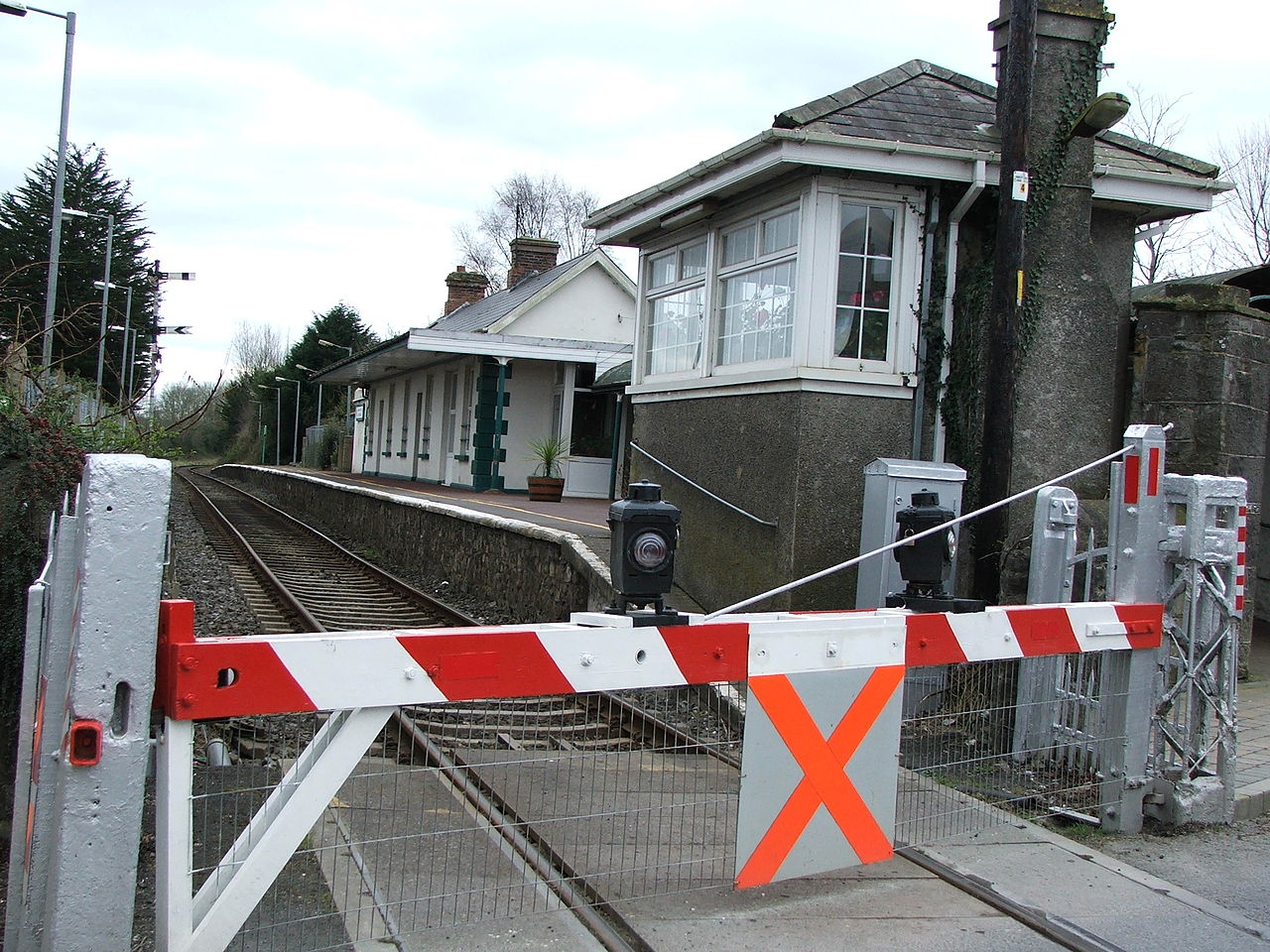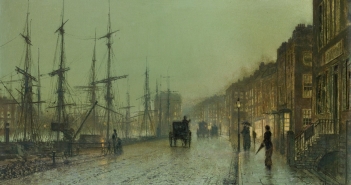Awarded one of the Tidiest Towns in the nation, the place was profoundly inept and utterly corrupt. Indeed disturbing, because winning the competition was proof positive that the town represented how things operated in the entire country. In terms of organisation, it was the stuff of nightmare. Everything had to go through countless committees, and the people you’d want absolutely nothing to do with were the kind who joined the committees.
When he did think about them, White merely pictured those broken plastic corrugated sheets which had been haphazardly assembled to form a makeshift roof over the old train station. Effectively it was the first view any observant person would have upon arrival. What did this tell you about the country? Here was the town voted, again by countless committees, as being the Tidiest Town in Ireland, and yet the minute you got off the train, you looked up at the train station itself, at these gaping holes in the shattered corrugated plastic sheeting. It was pathetic, thought White, as it revealed the corrupt nature of an entire island. The whole nation, by voting in this way, or rather the Committees who had voted for the town, by recommending that the town should receive the highest accolade in the land, were actually complicit in praising the most mediocre of towns. Mediocrity was their aim. It was as if, for White, these loose panels of plastic, which during winter would let in buckets of rain, while every year the town’s commuters sheltered under the awful structure, getting wet in the process, had become symbolic of the country’s lack of rigour. Its shambolic state.
He understood why large sections of people in the North wanted nothing to do with the place. Because the level of ineptitude and corruption was shocking. There it was. Visible for all to see, pondered White, who stood under the atrocity. I mean corrugated plastic sheeting! Who in their right mind was going to use such a material to protect the town’s citizens and visitors from the elements? It was the first of many signs that discreetly whispered, These people don’t really care about anyone in the first place. And, if a job was worth doing, it was worth doing badly. That was it, wasn’t it? The “Ah sure, it’ll do!” attitude his neighbour Stan was always banging on about whenever he spoke of the place. Stanley was rarely in country, spending the majority of his time working as a consultant around the world. About what, White didn’t actually know. It was kind of a mystery, but Stan made it very clear to White how much he hated the place and a lot of his fellow Irishmen.
The open hole in the sheeting spread out in a star formation. It was frayed into bits. Where it was not broken, it was black with dirt, moss and other under growth. As if nobody had actually thought about cleaning it up, not to mention fixing it by replacing it with, at the very least, new sheets.
“Ah, sure it will do!”
“If a thing’s worth doing, it’s worth doing badly.” Stan would say. “Bunch of fucking morons!”
Every word was spoken with that crisp nearly perfect enunciation that Stan possessed. It would be the closing punch line in these sessions after having looked at and examined the problem from every possible angle. White had never before brought up the lamentable condition of the roof of the town train station with him before. You see, unlike White, Stan wasn’t a commuter. They inhabited very different worlds. Whereas White was grounded firmly in the everyday world that he saw around him, in other words that of the town, and the city beyond, where he worked, and which was only thirty minutes south by commuter train, Stan’s world was one of airports and hotels. Corporate zones. Stan was very corporate. He exuded the spirit and parlance of international corporatism. White was more about the local.
Stan was unaware as to the everyday workings in a town where they both lived, and that never ceased to amaze White. While he looked at Stan with incredulity at times, about his innocence, Stan would throw White some pretty incredulous looks when in turn, his lack of savvy on certain matters at an international level was too obvious to ignore. Merging their knowledge of the micro and the macro, together, the two men were, in a sense, whole.
But they discussed countless other issues together. No, the broken corrugated plastic sheeting hanging over the heads of commuters on the platform outside of the town’s train station was a topic from which he had spared Stanley. Smiling now, White, regarded the drab excuse for a roofing feature. The sheer gombeenism. The degree of decay on a shameless exhibition to all and sundry had to be seen to be believed.
White put it down to Ireland’s post-colonial heritage. Casting a condescending glance at some of the town’s inhabitants as he did. For instance, if you looked at the actual railway station itself, apart from the roofing, it was a fine old building, as many of the old train stations were, having been designed and built by the former occupying power. There you had it then. The very infrastructure had been inherited. Nothing, not the laws of the land, nor the great buildings that housed their government and courts (bar one) had all just been taken over. That was a century and three generations ago. White’s own grandfather had fought in that war. The War of Independence, they called it. What a joke. They were no more independent of their so-called old enemy as the man in the moon.
White looked at his watch. The train would be coming soon. He walked with a quick pace further down the platform. He wanted to get away from the broken corrugated plastic roofing. Another joke. And there were so many of them too. Sick jokes, that is.
Once inside the train, White’s mood improved slightly. At least he had a seat. That was another thing. There were so few trains now that he noticed more and more people would have to stand, and starting with the commuters from the town just after his own. Imagine that, every day, five days a week, getting on the train with your commuter ticket that you had paid for and you would never have, or only rarely, the opportunity to sit down! That was more of it, the chronic sense that nobody really gave a shit about anyone or anything anymore. There was no sense of community. No civic pride. Why would there be? What had they done? In over a hundred years, what had they actually done to the country since their newfound freedom?
While White sat there looking around him, the recorded voice came over on the intercom system. It announced the next town in Irish. Nobody spoke the language, or hardly anybody, and yet that was even more of it. The con. Our government printed every document out twice, first in Irish, which was the official language of the country, and then in English which was a language everyone actually spoke. Why they insisted on imposing the language in this way was all part of it. Keeping up Appearances. A great little nation, the Republic of Ireland, for keeping up appearances. Truth be told, White couldn’t stomach it. This Ireland created by all of its little committees. You couldn’t fart without some fucker complaining to a committee.
He remembered reading somewhere that all revolutions were destined to fail. It was inevitable. Once a revolution had taken place, corruption set in from the word go. This was human nature. There would always be some kind of favouritism. And the types of people who got involved politically, no matter where you were, were always one and the same. Barring, of course, the very rare exception. Chancers who, for the most part, were merely looking out for number one. It was the same the world over. Why should Ireland be any better, or any worse.
While the train slowed, pulling into the next town, White watched the disappointed faces of new commuters who boarded the train. And who had, as usual, missed the opportunity of sitting down. When he was much younger, White would no doubt have given up his seat to one of them. Women in particular, as that’s the way he’d been brought up. But not now. This was the age of equality. White looked hard at some of the women who were now standing up around him. Resigned faces staring out a window at the Irish sea. How did they like this brave new world? Sometimes, very rarely mind you, some guy would grow embarrassed and offer up his seat to one of them, but it was rare now. Pathetic. And all part of it. Everybody hermetically sealed in their own little bubble. Nobody speaking to anyone else. Addicted to their phones. Passive, they listened to radio propoganda or some endless podcast, or perhaps even watched a feature film. Not a sinner reading a real book.
That was another myth, a nation of great readers! Ha! Cunts. Not one of them had read a book by James Joyce. His wife, an Italian who had studied both law and literature at university, worked in a busy solicitor’s office in the city centre. The ignorance of the people there had been appalling. Joyce was revered as essential reading, and yet here, in the cuntry of his birth, (a country from which he notoriously sought exile) hardly anyone at all had ever read him. Anything intellectual was immediately disdained. A myth? No, that was indeed the reality here.
Joyce made White’s mind jump to an idiot who lived in the same town. He had met him under the plastic corrugated roofing on the train station one sunny morning. For some reason Joyce had come up in their brief discussion.
“My opinion is as good as anyone else’s, isn’t it?” He had asked White.
White just laughed, knowing that by the man’s own admission he’d hardly read him at all, and yet he felt compelled to ask such a ridiculous question. Not only that, but he genuinely believed it too. It simply beggared belief how stupid some people could be. But as Stanley’s almost obnoxious North American drawl came crashing in. Every word was perfectly enunciated, to double the effect.
“Bunch of fucking morons.”
Just hearing somebody voice the truth out loud made White feel better. Smiling now from ear to ear, he decided that what made us human was the pleasure of sharing.




